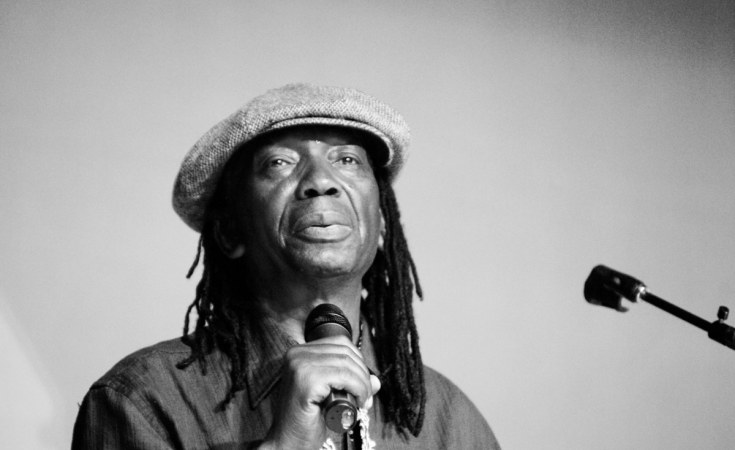ZANU-PF's aversion to protest music only confirms the lyrical power of a line of artists from Marley and Mapfumo to Winky D.
Prominent Zimbabwean artist Wallace Chirumiko - popularly known as "Winky D" or "The Big Man" - was shut down on 4 March as he performed his hit song 'Ibotso', which refers to state-sanctioned corruption in the country. It's not surprising. This is, after all, an election year, and with four months to D-Day the ruling ZANU-PF's is in the mood to stamp out any criticism. It is ramping up its campaign-season programme of repression.
Winky-D's shutdown shows the extent of music's centrality to political struggles, a theme that across sub-Saharan Africa is both historical - dating back to the days of struggle songs during many countries' liberation struggles - and recurrent - many artists today use creative means of expression to draw attention to present-day issues. When this is muzzled by the state, it not only tramples on the right to freedom of expression but blocks an important channel through which matters of public interest, such as corruption, can be addressed - channels that are arguably as important as media outlets.
Music was central to the liberation struggle in Zimbabwe, serving as a means to articulate the plight of the colonised natives during British rule (1923-1980). In 1979, the government in what was then Southern Rhodesia banned Thomas Tafirenyika Mapfumo's song 'Hokoyo'. In it, Mapfumo uses idioms like "Nyoka Musango", which loosely translates to "snake in the bush" and refers to colonial fighters. Musicologists observe that Mapfumo's music reflects his dissent during the Second and Third Chimurenga wars of political liberation.
Bob Marley & The Wailers' independence-day performance at Rufaro Stadium of their album Survival, with the iconic track 'Zimbabwe', was the show-stopper event of the inaugural 18 April 1980 celebrations. The cover of the album depicts the flags of several African nations that had gained independence. In 'Zimbabwe', Bob Marley & The Wailers sing about the importance of fighting for freedom:
We gon' fight
We gon' fight
We'll have to fight (we gon' fight)
We gonna fight (we gon' fight)
Fighting for our rights.
Music continued to serve as a medium through which revolutionaries and activists in Zimbabwe could redress injustices. It also continued to be repressed, as former president Robert Mugabe's (1980-2017) authoritarian regime endeavoured to shut down any criticism of ZANU-PF in the civic space.
Mapfumo's artistic expression also did not stop after independence. He continued to represent the voiceless through artistic means. During Mugabe's 37-year rule, Mapfumo's music continued to be scrutinised by the regime. In particular, the Mugabe administration sought to censor songs like 'Corruption', which contained the lyrics:
Munyika muno maita corruption/
Munyika muno maita disaster
There is corruption in this country
In this country there are strong plagues
Other vocal artists on Mugabe's radar included Oliver Mtukudzi and, in particular, his song 'Bvuma wasakara' (accept you are now old). Mugabe's regime banned this song because a majority of Zimbabweans began to refer to him as an old man, suggesting he was unfit to continue in office. Kusakara means to become useless in Shona. For example, if referring to a tablecloth, it would mean the cloth has reached a state of wear and tear that is beyond repair. This is analogous to Mugabe. Given the backdrop of repression, Zimbabweans were elated when in 2017 Mugabe was forcefully removed from power.
But can a leopard change it spots? After being replaced by Emmerson Mnagagwa - a figure who held senior positions in the Mugabe regime - artistic expression continues to be undermined. This is contrary to Zimbabwe's constitution which asserts at Section 61(1)(b) that "everyone has the right to freedom of expression, which includes freedom of artistic expression and scientific research and creativity".
Sensing a change in regime, Mapfumo, whilst still in exile, released the song 'Chauya Chauya' in the lead-up to general elections in 2018. In it, he sings "Yavesarudzo MuZimbabwe, Sarura Wako Waundo" (It is time for elections in Zimbabwe, vote for the person you want).
However, artistic expression continues to be stifled in Zimbabwe despite a change in regime, as evidenced by the shut down of Winky D's performance. In the song 'Eureka Ibotso' - which usually refers to serious troubles that comes as a punishment to a son/daughter who physically beat his/her mother, a taboo in all Zimbabwean cultures - Winky D expresses his anti-corruption stance and refers to the current reality in Zimbabwe in which the general population is suffering owing to a few political elites looting the country's wealth. In it, Winky D speaks about "Kudya zvevapfupi nekureba" (eating/taking what belongs to the weak/majority using power and one's position of authority).
This song is widely perceived as a direct jab at the Mnangagwa administration. The decision to disrupt Winky D's show in Chitungwiza shows that artistic expression has been under threat in Zimbabwe for decades. Though there is a call for the Home Affairs Minister to answer why Winky D's concert was disrupted, little hope is held as to whether this will lead to any meaningful change and accountability within the country.
Mwai Daka is a PhD student at the University of Gloucestershire in the department of Politics and International Relations. His research focuses on freedom of expression and internet shutdowns in sub-Saharan Africa. He is also a former Regional Correspondent for University of Oxford's Human Rights Hub and an Associate Editor for Democracy in Africa.


